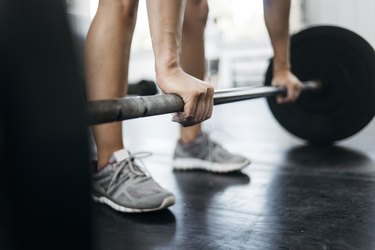
When it comes to weightlifting, there are many different schools of thought on which style of training is best. However, lifting lighter weights for more repetitions works your muscles just as much as doing just a few reps with very heavy weights, so you'll gain the same amount of strength either way.
Still, the weight amount does affect the type of muscle fibers recruited when you lift, which determines whether you're building endurance strength or explosive strength. One of the benefits of lifting heavy weights is increased release of muscle-growth and fat-burning hormones, compared with lifting light weights.
Video of the Day
Video of the Day
High Reps vs. Low Reps
Your muscles are made up of two types of muscle fibers — slow-twitch and fast-twitch. All your muscles have both types, but the type of fiber activated during an exercise depends on your exertion level.
Lifting weights so heavy that you can't quite manage 10 reps requires fast-twitch muscle fibers for explosive power. Lifting lighter weights for more than 20 reps recruits your slow-twitch muscle fibers for muscular endurance.
Heavy Weight vs. Light Weight
There are many benefits of lifting heavy weights. If your goal is to increase the size of your muscles, you'll want to lift heavy weights for a few explosive reps. More muscle-growth hormones will be released, stimulating faster muscle growth. This won't cause women to bulk up, however, since women have less testosterone than men. The benefit of more muscle growth hormones in women is that while your muscles won't get bigger, their appearance will be enhanced by muscle definition.
The explosive power you gain from lifting heavy weights is required for jumping, sprinting and other quick movements. Muscular endurance, gained by lifting lighter weights for more reps, helps with extended cardio activities such as long-distance running and cycling.
Burn That Fat
Lifting heavy weights burns more body fat than lifting light weights, and the heavier the weight, the more calories you burn with each rep. Because they recruit fast-twitch fibers, heavy weights also burn more fat after your workout.
Fast-twitch fibers tap into fat stores in your body for energy, since it's available more quickly than oxygen. As a result, lots of fat-burning hormones are released that continue burning fat eight hours after your workout. Light weights recruit slow-twitch fibers, which only continue burning fat for an hour after your workout.
Boost Your Metabolism
Lifting heavier weights for a fewer reps, which calls for a shorter workout, actually builds more muscle than a longer workout using lighter weights. The more muscle mass you have, the faster your metabolism will be. You'll burn more fat even when you're not working out, because muscle burns more than fat.
Health and Safety
Heavy weights build more bone density than light weights. Because you naturally lose bone density over time, maintaining high bone density is crucial for warding off osteoporosis, especially for post-menopausal people.
Pick up heavy weights by bending at the knees, rather than the hips or back. The safest way to lift heavy weights for a few explosive reps is to use machine weights, so you don't have to balance the heavy weight in your hands or on your shoulders.


